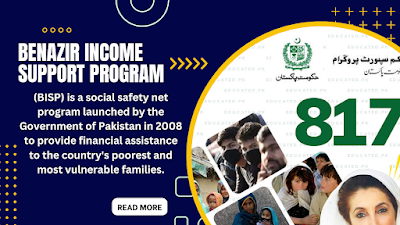Benazir Income Support Program
The Benazir Income Support Program (BISP) is a social safety net program launched by the Government of Pakistan in 2008 to provide financial assistance to the country's poorest and most vulnerable families. The program provides regular cash transfers to eligible households and aims to alleviate poverty and provide a safety net to those in need.
In 2023, the BISP program has seen an increase in funding to better address the economic impact of the COVID-19 pandemic. The program now provides additional support to families affected by the pandemic, including those who have lost their jobs or experienced a reduction in income. This additional support will be provided through the distribution of food packages and cash transfers to eligible families.
The eligibility criteria for the BISP program have also been revised to include families who have been affected by the pandemic but are not currently enrolled in the program. This expansion of the program is aimed at ensuring that the most vulnerable families receive the support they need during these difficult times.
To ensure the effective implementation of the program, the government has taken steps to streamline the enrollment process and improve the targeting mechanism. This includes the use of technology such as biometric verification and mobile banking services to enhance the transparency and efficiency of the program.
In addition to the cash transfers, the BISP program also provides access to other social protection services, such as skills training and job placement assistance. This aims to empower families and provide them with the tools and resources they need to lift themselves out of poverty in the long-term.
To further support the program, the government has also established partnerships with private sector companies to provide job opportunities to eligible families. This will provide families with a sustainable source of income and help them to achieve financial stability.
The BISP program has received positive feedback from beneficiaries and is widely recognized as a key component of Pakistan's poverty reduction strategy. The program has not only provided financial assistance to families in need, but it has also had a positive impact on the country's economy by stimulating demand for goods and services.
However, despite its successes, the BISP program has also faced challenges, including issues with the targeting mechanism, leakages in the distribution process, and inadequate funding. To address these challenges, the government has implemented measures to improve the efficiency and effectiveness of the program, including regular evaluations and monitoring.
In conclusion, the BISP program has made a significant impact in reducing poverty and providing a safety net to the most vulnerable families in Pakistan. The increase in funding and expansion of the program in 2023 will ensure that families affected by the COVID-19 pandemic receive the support they need to weather the economic crisis. With continued efforts to improve the program, the BISP is poised to make an even greater impact in reducing poverty and improving the lives of families in need




0 Comments